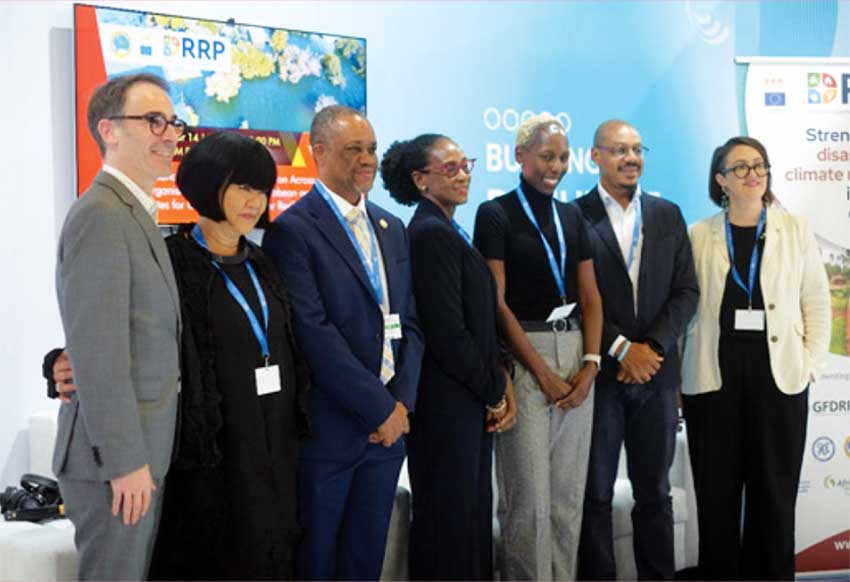
BAKU, Azerbaijan – Limited technical expertise, is undermining the ability of Small Island Developing States (SIDS) to adapt to climate change, leaving these vulnerable territories increasingly exposed to mounting natural hazards. This was the consensus among experts participating in a panel discussion on Enhancing Strategic Collaboration for Climate Disaster Resilience during COP29 in Baku, Azerbaijan.
As climate disasters continue to threaten lives and livelihoods, speakers at the event, hosted by the Caribbean Development Bank (CDB), the Pacific Community, the Organisation of African, Caribbean, and Pacific States (OACPS), and the European Union, called for stronger partnerships, targeted capacity-building and streamlined financing to tackle the escalating impacts of climate change for the most at-risk nations.
With the European Union allocating €28.6 billion to climate finance in 2023, including €11 billion for adaptation, regions like the Caribbean and the Pacific are increasingly benefiting from international support. However, significant challenges remain, including accessing funding due to technical and institutional barriers.
Dr. Pendo Maro, Technical Assistance Team Leader of the OACPS’ Disaster Risk Reduction Programme (DRRP), underscored the persistent challenge of technical and institutional constraints despite the availability of financing for climate-related projects.
“Capacity remains a critical issue. Even after funds are accessed, there is still a challenge in implementation. This isn’t just about building capacity—it’s about capacity supplementation, strengthening, and ongoing support. Once capacity is built, it can diminish over time, and we may still need to supplement it to ensure that projects can be delivered effectively. The question is: how can we implement projects if we don’t have enough capacity at that level?” Dr. Maro said.
Recognising the shared vulnerability of SIDS, the panelists stressed the importance of unified action to unlock critical resources, align strategies, and implement innovative solutions. Highlighting the potential of Green Climate Fund (GCF), Readiness funds, Ms. Crystelle Pratt, Assistant Secretary-General of OACPS, stressed the importance of collaboration between regional agencies and member states to fully utilise available funding.
“It is imperative that we (countries) move beyond fragmented efforts and work in a unified, coordinated manner. These funds are rightfully ours, but without collaboration between regional agencies and member states, we risk losing them. The success of accessing and utilising these critical resources hinges on a collective approach—where respect and responsibility are shared across all levels. Only through strengthened partnerships and clear coordination can we ensure that these funds are maximised for the benefit of our region’s development and resilience efforts,” Ms. Pratt said.
The Caribbean Development Bank’s (CDB) Acting Director of Projects L. O’Reilly Lewis who echoed the call for a holistic approach to resilience, emphasising the integration of disaster risk reduction and climate considerations into national and regional development strategies.
“No single organisation or entity can address these challenges alone. We need a holistic approach for climate and disaster resilience. This approach involves embedding disaster risk reduction and climate considerations into National and Regional development strategies, ensuring sound macroeconomic policies and the adoption of renewable energy and energy-efficient practices.”
Ms. Valerie Isaac, Division Chief of the CDB’s Environmental Sustainability Unit, highlighted CDB’s Caribbean Action for Resilience Enhancement programme as a successful endeavour, whose financing was used to install multi-hazard early warning systems in several countries across the region.
“Disasters don’t just set us back, but they drive communities into poverty. The partnership with the CDB is of extreme value to the Caribbean, as it brings critical grant resources directly to the communities who need them most. It provides an opportunity to advance climate change adaptation, which is a priority for the region, and helps address immediate risks related to governance and decision-making at the community level,” Ms. Isaac said.
The Disaster Risk Reduction Programme, under the 11th European Development Fund, was also celebrated as a model of effective collaboration, uniting institutions like CDB, the Organisation of Eastern Caribbean States, and the University of the West Indies to implement climate-proof infrastructure, multi-hazard warning systems, and community-level projects.













